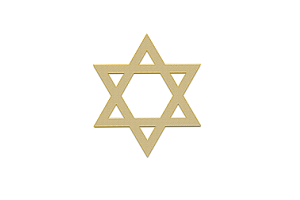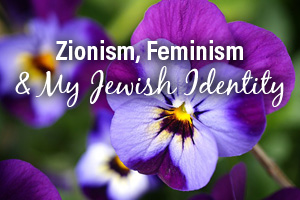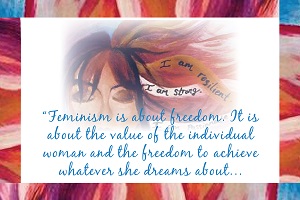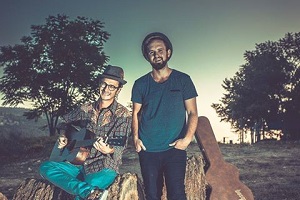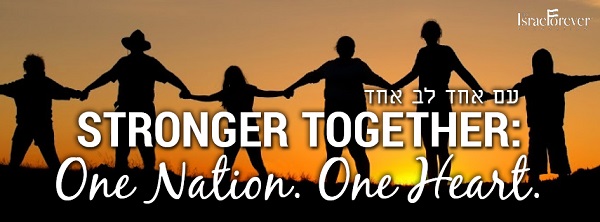I don’t believe in God but I do believe in Israel
by Sophie Leib-Neri
An atheist Jew. This is the identity I have given to myself. Some Jewish people may argue that I am not Jewish at all. That my inability to believe in God, is an inability to practice Judaism as a whole. I respectfully disagree. I was raised as a reform Jew by a Jewish mother and my Holocaust surviving grandfather. My dad is an avid atheist, once-Protestant Christian. While he wholly rejects organized religion, he still dutifully drove us to Yom Kippur services, learned the blessing over the wine (his favorite), and helped fund our Jewish education.
Both my parents instilled different values within my sister and I. My dad’s were based in seeking greater education, challenging the norm, and continually asking questions (very Jewish values!). My mom’s values were rooted in our Jewish heritage. She instilled our passion for giving, love of culture and dedication to family.

This me and people from confirmation class at a conference in DC for Jewish social justice where we lobbied for disability rights to our local congressman.
My synagogue’s Jewish education was focused on stories teaching morals, Jewish history, and cultural traditions. Yet, and somewhat to my dad’s delight, I came back from Sunday school with doubts in my mind. My dad vividly remembers asking me about my first day of Sunday school and my response being, “Well apparently Jonah lived in a whale for a week.” My skepticism only furthered from there but, even so, my love for Jewish culture and teachings was strengthened.
I valued my Jewish learning as I believed it helped develop, not only my Jewish identity, but solidify my character. I don’t need to prove my Judaism to anyone. I know I am Jewish because I embody Jewish values, I embrace Jewish culture, and I constantly question my Jewish teachings. The belief in God (or lack thereof) does not influence my ability to engage in these actions which I consider central to my Jewish identity.
Israel had never been a part of my Jewish education. We never touched on it in Sunday school, it never appeared in my Jewish philosophy classes, and I do not have any family living there. Honestly, I was frustrated that people assumed my affinity for Israel simply because I was Jewish. I had never even been to the country, how was I supposed to be calling it my home?
So I went on Birthright. I experienced Israel. I spent ten days travelling a country with a group of essentially strangers, our only commonality being our Jewish identity. I made lasting friendships and saw the beauty and majesty of the Israeli landscape. Birthright truly made me love and appreciate Israel.
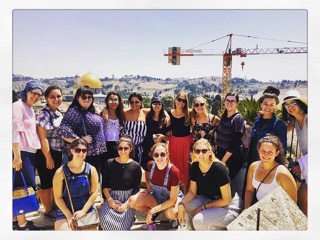
This is me on my current program in Israel. We are at an overlook of the Western Wall
But Israel is not perfect. I extended my trip in Israel to participate in an internship and Jewish learning program run by Orthodox Jews. After a week of living in Jerusalem and attending our Jewish learning classes, I immediately felt the overwhelming sensation that I didn’t belong. Two days in a row I was harassed on public transit. I was told to sit at the back of the bus away from the men, because my shoulders were exposed. Furthermore, our Jewish learning classes given by Orthodox speakers explained that the meaning of life is to connect with God; that the way to find happiness is to create a relationship with God; that Judaism is not a culture or a religion, but rather a relationship with God. I didn’t know how to relate to that.
Here I was, in Israel, taking Jewish learning classes. Was I really being told that I am not Jewish?! How could I not be Jewish? My mom was Jewish, I was bat mitzvahed, I had studied Torah, I worked at my Hillel, and here I was spending my summer in Israel. I had never felt more unaccepted in my life and I was living in the Jewish state, considered to be my home.
I spent the weekend away from Jerusalem in Ein Gedi. My friends and I befriended hippies, took a somewhat alternative route to the Dead Sea, and danced all night with two beautiful Israeli women. On our way back to Jerusalem we were passed by two buses. We nervously sat on the side of the road in the middle of the desert as the sun was disappearing behind the mountains. We called the Israeli men we had befriended at our lodge and within five minutes we had two men keeping us company and a taxi called especially for us was on its way.
Like any country, Israel is complex. It has both good and bad aspects and I am grateful to have experienced both. I have witnessed its devote Jews that are just as passionate about exposed shoulders on the lightrail as the hippies in Ein Gedi are about nature conservation. Israelis are rigid, they are free-spirited; they are religious, they are secular; they are talkative, they enjoy the quiet; they are cosmopolitan, they are conservationists. For every one Israeli that is one way, there is one that is the complete opposite. Yet all Israelis share one common trait. Passion. Whether it’s passion for religion, or nature, or politics, or food, or dancing, Israelis are passionate.
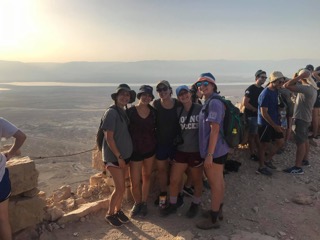
This is me on Birthright at the top of Masada
It is hard to understand Israel without having visited. As a former abstainer in support of Israel, I now realize its importance. For those that are religious, there is something immensely special about having a Jewish state that sits on the Holy Land of Israel. For someone that doesn’t believe in God, even I can appreciate the specialness in the Land of Israel as it seems to seamlessly sprawl from lush green valleys to dry mountains.
For those that are not as religious, Israeli culture and tradition is rooted in Jewish culture and tradition. How is it that I have no family in Israel, yet it feels as though I am surrounded by artifacts that remind me of home? A freshly baked challah may be a rarity in an American bakery, but is commonplace in Israel. The Yiddish phrases that were crucial to my upbringing can be frequently overheard on public transportation as all the Jews complain about schvitzing from the hot Jerusalem sun.
I now understand that education about Israel is crucial for Jews everywhere, of all kinds. This is the fundamental motivator behind the Israel Forever Foundation. Stepping into this office for the first time and speaking with Elana, Israel Forever’s Executive Director (an example of the aforementioned passionate Israeli), I immediately felt the eagerness with which this foundation wants to educate Jewish people. While we can’t all be as passionate as Israelis, the more we strive to educate and learn from each other the greater our bond to Israel and our Jewish identity will become.

Sophie is a rising junior at Washington University in St. Louis studying political science, leadership and strategic management, and philosophy. Originally from Chicago, this is her first time in Israel. In addition to her time at the Israel Forever Foundation, she will also be working in the Knesset for MK Michal Biran.

